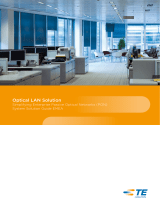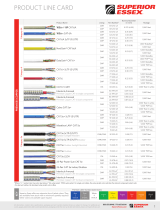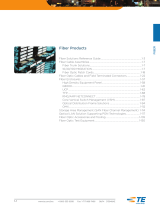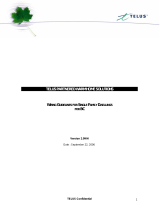Page is loading ...

LM-RDT I/O CMP
Installation Instructions

LM-RDT I/O CMP is a Category 6A cable designed to withstand a wide range of environments common to slab-
on-grade installations. The cable’s flexible PVDF jacket allows it to be routed easily through underground
conduit, plenum air spaces, and short exposed outdoor runs within the building footprint. By using the practices
outlined in this guide, the cable can also be installed in conduits that may occasionally experience water ingress
when conduits are designed to properly drain the water ingress.
Because the cable does not contain a water blocking gel, it is critical to protect the cable ends and jacket during
installation. This guide will provide several options for protecting the cable ends from water ingress during
installation using the provided kit. The cable jacket must remain unabraded during installation in order to prevent
water ingress from negatively impacting cable performance.
1.1
Technical Specifications
Standards & Regulations
•
ANSI/TIA-568.2-D Category 6A
•
RoHS Compliant
•
IEEE 802.3bt PoE Type 1, 2, 3, 4 (90 watts max)
•
Cisco UPOE, UPOE+ (90 watts max)
•
Power over HDBaseT™ PoH (95 watts max)
Fire Rating
•
Plenum-NFPA 70, CMP
•
CMX-Outdoor CMP
•
UL Listed as CMP-LP (0.8 A)
1 INTRODUCTION

2.1 Transition Points Within Building
This product’s dual-rating (CMP & CMX-Outdoor) allows it to be routed easily throughout a range of locations
that typically require a transition between two types of cable. Because the jacket is highly impervious to water,
chemical-resistant, and CMP rated, it can seamlessly pass-through wet environments and plenum air spaces—
simplifying installation.
2.2 Limited Outdoor Usage
Although LM-RDT I/O CMP is not designed to be a replacement for outside plant cable, it is suitable for certain
outdoor applications. The cable carries a CMX Outdoor rating, which means that it has been verified for both
sunlight resistance and cold impact. This makes it suitable for short outdoor runs where the cable is exposed to
the elements—e.g., being mounted to the side of a building in order to support an outdoor wireless access point.
If mounting the cable to an external wall, it is important to use appropriately sized cable clamps and assure that
connection points are protected by suitably rated enclosures for the environment. Drip loops should be used in
order to impede the infiltration of water into the building. The cable is not self-supporting, and thus requires
lashing and messenger strands for aerial installations. Aerial installations must be performed in accordance with
Chapters 6 and 7 of BICSI G2.2-22. Furthermore, the cable is not designed for direct burial.
2 APPLICATION ENVIRONMENTS

Because this product is a gel-free cable, the leading end must be protected from water ingress during installation
using one of the methods described in Section 3.1.
Ensure conduit is installed per BICSI OSPDRM & TIA-758.
There are three methods of protecting the cable end from water ingress. All are valid methods and can be used
based on the availability of equipment. The preferred method is 3.1.
•
Method #1 – Heat gun required (3.1)
•
Method #2 – Lighter required (3.2)
•
Method #3 – Vinyl electrical tape only (3.3)
*Total prep time is estimated to be 2 minutes per end following the methods below
*Methods #1 and #2 produce the smallest prepared end OD
*Use shrink tube provided with each reel of cable
oIf additional shrink tube is required, please use Digi-Key Part Number A014B-4-ND or equivalent
3.1 Method #1 - Heat Gun Required
3.1.1 Begin preparation by sliding a 2.5” long piece of shrink tube 1” onto the cable end
3.1.2 Heat the shrink tube with a heat gun until it is constricted around the cable and the portion beyond the
cable is reduced to its minimum diameter. Rotate the cable to assure that all sides of the tubing are shrunk.
Caution - Hot!
ALLOW THE SHRINK TUBE TO COOL FOR A FEW SECONDS BFORE PROCEEDING
3 INSTALLATION PREP

3.1.3 Once the shrink tube is cool enough to touch, fold it back and wrap with vinyl electrical tape until the tape
extends ~1/2” beyond the base of the shrink tube. Failing to tape beyond the base of the shrink tube could
result in it being pulled off during installation.
3.2 Method #2 – Lighter Required
3.2.1 Begin preparation by sliding a 2.5” long piece of shrink tube 1” onto the cable end
3.2.2 Heat the shrink tube with a lighter until it is constricted around the cable and the portion beyond the cable
is reduced to its minimum diameter. Rotate the cable to assure that all sides of the tubing are shrunk.
Caution - Hot!
ALLOW THE SHRINK TUBE TO COOL FOR A FEW SECONDS BFORE PROCEEDING

3.2.3 Once the shrink tube is cool enough to touch, fold it back and wrap with vinyl electrical tape until
the tape extends ~1/2” beyond the base of the shrink tube. Failing to tape beyond the base of the shrink
tube could result in it being pulled off during installation.
3.3 Method #3 - No Heat Gun or Lighter
3.3.1 Begin preparation by sliding a 2.5” long piece of shrink tube 1” onto the cable end
3.3.2 Affix the shrink tube to the cable using vinyl electrical tape
3.3.3 Fold the shrink tube back and wrap with vinyl electrical tape until covered

Once the leading end of the cable is protected, it can be installed per the best practices outlined in the BICSI
Information Technology Systems Installation Methods Manual (Latest Edition). The cable can then be terminated
with Leviton Cat 6A connectivity using the provided instructions.

This product is subject to the terms & conditions outlined under the Leviton Network Solutions Warranty
Information found on the Leviton website and the limitations described in this guide. Failure to comply with this
instruction will deem cable warranty void.
This cable is NOT designed for the following applications:
•Direct burial
•Standing water
•Self-supporting aerial installations without lashing and messenger wire
•Underground installation between buildings and to remote locations that leave the building footprint
•Installation across rough or sharp surfaces that could abrade or puncture the cable jacket
This cable is intended for use in the following applications
•Termination with Leviton Category 6A connectivity
•Installation within potentially wet and damp environments using the provided instructions and cable prep
kit
•Routing through underground conduits within the building footprint that follow the best practices outlined
in the BICSI Outside Plant Design Reference Manual (Latest Edition) and installation standards listed in
ANSI/TIA-569-D
•Installation within all indoor air spaces permitted by CMP-rated cable as stated in the current edition of
the National Electrical Code® (NFPA 70®)
•Limited outdoor exposure per CMX-Outdoor rating described in UL 444
4 WARRANTY
/




